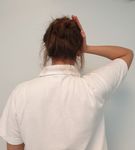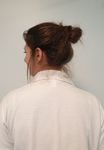Neck pain - King's College Hospital
←
→
Page content transcription
If your browser does not render page correctly, please read the page content below
Neck pain
Information for patients
This leaflet has information and advice on how to manage your neck pain.
If you have any queries or concerns please contact your GP.
What is neck pain?
Neck pain is a common problem that will affect almost everybody at some stage in their life.
Symptoms can include pain, stiffness and discomfort in the neck or shoulders that can be caused
by no obvious reason. Most neck pain will improve within a few days or weeks with simple self-
help treatments, and will not cause any long-term damage.
Mechanism of injury
There are many different reasons for developing neck pain, however the most common
cause is a simple muscle strain or increased tension. Your neck consists of a column of
bones, called vertebrae, which are surrounded by several strong muscles that work
continuously to keep your head upright and produce movement freely. There are factors
that cause these muscles to work harder, resulting in increased pain and tension in the
neck.
• Minor injuries, for example, whiplash injuries, turning your head quickly causing the
muscles to stretch further than normal
• Poor posture, for example, pushing your chin forward, hunched shoulders, prolonged static
postures
• Emotional and psychological stress, for example, contracting the neck and shoulder
muscles continually due to stress
Symptoms
You can get neck pain in one or both sides of the neck, into the base of the skull and down to the
shoulders. Movement can be painful and tightness may occur, causing a reduction in the
movement of your neck. You may also have muscle tenderness and sensations or sounds of
clicking or grating. This is a result of bony surfaces moving over one another, or by ligaments
rubbing against bone. Although this may sound or feel worrying, it is not serious or abnormal
and is actually very common.
Management
• Ice or heat: a hot or cold pack can provide short-term pain relief. Apply this to the area for
up to 15 minutes, every three hours and up to four times a day, ensuring it is never in direct
contact with the skin.
1• Relaxation: increased levels of stress can cause neck and back pain. Learning to practise
relaxation, meditation or mindfulness techniques may be a useful management tool to
reduce stress and general wellbeing.
• Relative rest: reduce activities that are aggravating your symptoms, for example, the length
of time spent at your desk in a single sitting or the amount of heavy lifting.
• Painkillers: pain relief can help manage the discomfort in the short term. Normally
painkillers bought from a pharmacist will work. If you have any questions please speak to a
pharmacist.
• Exercise: you should complete exercises that aim to strengthen and help the way you move
in order to return to your normal activities. Please see below for suggestions of a graded
exercise programme.
Follow-up
You do not routinely require physiotherapy for this type of injury. Most find they improve
with time, general exercise and returning to normal daily activities. If your neck pain does not
improve after 8 to 12 weeks then you may benefit from physiotherapy, we recommend you contact
your GP to refer you to your local physiotherapy department.
Healing
This type of injury can take about 3 to 6 months to resolve.
Please follow the rehabilitation plan shown below:
Weeks Rehabilitation plan
since
injury
0 to 2 Begin the ‘stage one exercises’ on page 2 of this leaflet
weeks Follow the management advice as per above
Continue to move your neck gently to encourage
movement and reduce stiffness
Avoid neck braces or postures where you are guarding
against movement
2 to 8 Once your pain has begun to settle, start the exercises
weeks below labelled ‘stage two exercises’.
2Stage one (3 to 4 times a day)
Postural awareness:
Position yourself sitting on a comfortable surface. Slowly tilt your pelvis forwards,
lift your chest bone up, draw your shoulder blades gently down towards the centre
of the spine, as if forming a ‘V’ shape. Gently lift the top of your head upwards,
ensuring that the chin is not poking forwards. Hold this position for 5 seconds and
then return to neutral.
Complete this 8 to 12 times, 2 to 3 times a day
Active range of motion: rotation:
Sitting in a comfortable chair, relax your shoulders and find
your neutral position. Slowly rotate your head to look over
your left shoulder then repeat to the right side. If this is too
uncomfortable, complete this exercise lying down initially.
Try to hold each stretch for 5 seconds and repeat up to
5 times.
Active range of motion: side flexion:
Sitting in a comfortable chair, relax your shoulders and
find your neutral position. Tilt your head so that you bring
your ear towards your shoulder. Then slowly return to the
middle and repeat on the opposite side.
Try to hold each stretch for 5 seconds and repeat up to
5 times.
Active range of motion: flexion:
Sitting in a comfortable chair, relax your shoulders and find your
neutral position. Keeping your shoulders down, slowly lift your
chin up towards the ceiling, then slowly bring your chin down
towards your chest. Finally, return to a neutral position.
Try to hold each stretch for 5 seconds and repeat up to 5 times
3Shoulder blade squeeze:
Position yourself standing with feet, hip width apart. Have your
shoulders relaxed and your arms down by your side.
Slowly bring your shoulders back by squeezing your shoulder
blades down and together maintaining, keeping your head in its
neutral position.
Slowly then relax your shoulders and return to your starting
position.
Hold for 5 seconds. Repeat 10 times. Repeat 3 times per day.
Stage two (3 to 4 times a day)
Chin tucks:
Sitting with your back unsupported, gently tuck chin into your chest as if making
a ‘double chin’.
Hold for 10 seconds. Repeat 10 times.
Isometric strengthening:
Sitting in a chair with your back supported and head
in the neutral position.
Place your hand on your forehead. Push your head
forward into your hand, whilst your hand acts as
resistance to movement.
Repeat this pushing sideways.
Push for 10 seconds, and then relax. Complete 5
times each direction.
Sharing your information
We have teamed up with Guy's and St Thomas' Hospitals in a partnership known as
King’s Health Partners Academic Health Sciences Centre. We are working together to
give our patients the best possible care, so you might find we invite you for appointments
at Guy's or St Thomas'. To make sure everyone you meet always has the most up-to-
date information about your health, we may share information about you between the
hospitals.
4Care provided by students
We provide clinical training where our students get practical experience by treating patients.
Please tell your doctor or nurse if you do not want students to be involved in your care. Your
treatment will not be affected by your decision.
PALS
The Patient Advice and Liaison Service (PALS) is a service that offers support,
information and assistance to patients, relatives and visitors. They can also provide help
and advice if you have a concern or complaint that staff have not been able to resolve
for you. The PALS office is located on the ground floor of the Hambleden Wing, near the
main entrance on Bessemer Road - staff will be happy to direct you.
PALS at King’s College Hospital, Denmark Hill, London SE5 9RS
Tel: 020 3299 3601
Email: kch-tr.palsdh@nhs.net
You can also contact us by using our online form at www.kch.nhs.uk/contact/pals
If you would like the information in this leaflet in a different language or format,
please contact PALS on 020 3299 1844.
PL951.1 March 2021 Urgent Care
Review date March 2024 Corporate Comms: 2414
5You can also read



























































